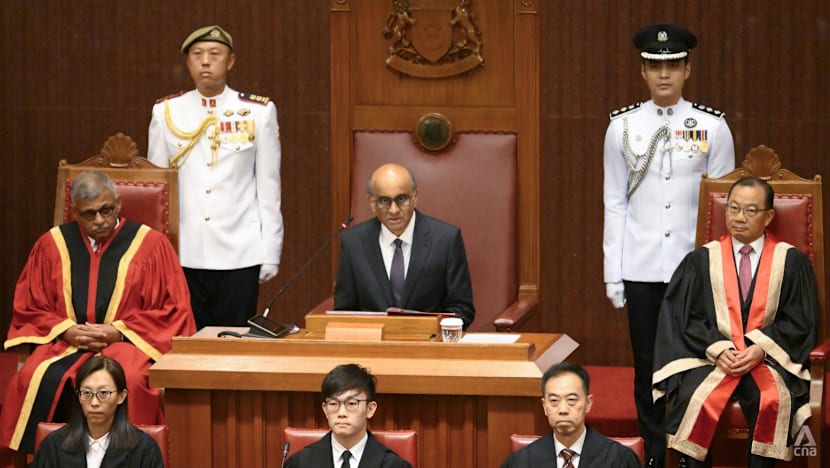President Tharman urges 'we first' mindset as Singapore refreshes economic strategy
In his address to the 15th Parliament, the president called for unity, shared responsibility and stronger community ties amid global uncertainty.

Singapore President Tharman Shanmugaratnam (centre) gives his opening address while flanked by Chief Justice Sundaresh Menon (left) and Speaker of Parliament Seah Kian Peng (right) at the first session of the 15th Parliament on Sep 5, 2025. (Photo: CNA/Wallace Woon)

This audio is generated by an AI tool.
SINGAPORE: President Tharman Shanmugaratnam on Friday (Sep 5) called on Singaporeans to embrace a "we first" mindset and prioritise the collective good as the country enters a new phase of economic transformation.
“We will nurture a 'we first' society at every level, starting in the community,” Mr Tharman said, adding that Singaporeans must “put the collective before self”.
The president's call echoed and built upon a key theme raised by Prime Minister Lawrence Wong at last month’s National Day Rally. Mr Wong had urged Singaporeans to adopt a “we first” attitude, emphasising shared responsibility and collective resilience.
Mr Tharman was speaking at the opening of the 15th Parliament, where he laid out the government’s agenda for the term ahead.
He highlighted that Singapore must adapt to "fundamental shifts" in the global economy, as rising geopolitical tensions, protectionism and technology disruption threaten its position as a global hub.
In a world where tensions may flare up suddenly, Singapore’s security should not be taken for granted, Mr Tharman said.
Security also means resilience against unconventional threats such as foreign influence, he said, adding that dangers at home must be equally guarded against, including terrorism, scams and drugs such as vapes laced with harmful substances.
ECONOMIC TRANSFORMATION
Mr Tharman said Singapore cannot compete on size but can win on speed, ingenuity and trust. But with global competition intensifying, the “old playbook” is no longer sufficient.
“Singapore must adapt faster and innovate more boldly – to enhance our value as a trusted hub for trade, capital and talent.”
Work has already begun to refresh Singapore's economic strategies, and it “will go deep into the issues that matter most” and involve restructuring industries and building deeper capabilities across sectors like advanced manufacturing, IT and clean energy.
The trust built through years of collaboration between the government, employers and unions positions the country to move faster in deploying new technologies like artificial intelligence while managing disruptions to the workforce, Mr Tharman added.
But even as the economy transforms, he stressed that help will be available to those who need it.
“Singaporeans should never face uncertainty on their own,” Mr Tharman said. “No one will have to walk the journey alone.”
To support those affected, he pointed to new initiatives such as the Jobseeker Support Scheme and SkillsFuture Level-Up Programme, which provide practical help for displaced workers and mid-career Singaporeans. These, he said, are part of a broader national effort to strengthen assurance and dignity at every stage of life.
Mr Tharman acknowledged the rising cost of living, driven by global conflicts, tariffs and supply chain disruptions. “That is why we will continue to cushion these burdens and ensure that every citizen has access to life’s essentials,” he said.
For the vulnerable, the government has worked hard to ensure fairer outcomes, he said. But the work is not done, and Singapore must continue to invest in children, strengthen training and career pathways for workers and uplift lower-income families.
“This is the promise of Singapore: that birth does not dictate destiny, that no one is left behind, and that every generation can look ahead with optimism and hope,” he said.
The 15th Parliament of Singapore opened on Friday (Sep 5), with Mr Seah Kian Peng elected as Speaker of the House.
PUTTING "WE" BEFORE "ME"
The president urged Singaporeans to "put 'we' before 'me'" in their everyday deeds and actions.
“A ‘we first’ society is not only about organised programmes,” he said. “It is equally about the values we live by, and our regular habits of care – from offering a seat on the train to lending a hand in times of need.”
The government will work with community leaders to expand “networks of care” and promote ground-up initiatives. There will also be more opportunities for volunteering and giving.
“We all have a role in building a culture of contribution, one where success is measured not only by personal achievement, but by what we do together for the common good,” he said.
While social divisions are hardening in many parts of the world, what makes Singapore exceptional is its unity, something that cannot be taken for granted, Mr Tharman said.
He warned against using race or religion for political gain or viewing national issues through such lenses, stressing that such divisions have had dangerous consequences elsewhere.
“Instead, we must continue to nurture what makes us distinctively Singaporean: the ability to accept our varied identities, to take a respectful interest in each other’s cultures, and to build common ground through shared experiences,” he said.
Mr Tharman said public trust in governments has declined in many countries, but Singapore has defied this trend. This is not because it is immune to similar pressures, but because it has “cultivated a different ethos of governance and politics”.
“We have valued stewardship over expediency, enduring responsibility over transient gain,” he said.
Singapore’s ability to make hard choices and plan long-term stems from trust – both in the government and between citizens. It is this trust that has allowed the government to make hard choices when needed, and to plan for the future beyond current electoral cycles, he said.
“Let us stay firm in our resolve, yet open to change; confident in our future, yet humble about our place in the world; proud of our diversity, yet united as one people.
“This is how we will build a better Singapore – not just for ourselves, but for our children and generations to come.”
INSPIRING AND SOBERING
MPs from the ruling party told CNA that President Tharman’s focus on social mobility resonated with them, but remained cautious about the trials that lie ahead.
For first-time parliamentarian David Hoe, the president’s comments on supporting disadvantaged families and youths struck him.
“What really stuck out for me was about how he said that we want to keep social mobility alive, and this is something that's really close to my heart,” said the Jurong East-Bukit Batok GRC MP.
Ensuring Singapore remains an equal society was also something that mattered to Sembawang GRC MP Vikram Nair.
This includes keeping housing affordable and making sure that good quality public services are accessible to everyone, he said.
Nee Soon GRC MP Syed Harun Alhabsyi said that President Tharman’s point on social mobility stayed with him, as well as the call to strengthen inclusive values as a society.
“I think that's ever more important, especially in the context of a polarised world, an uncertain world, where polarity and tensions are rife, not only in the world order, but also in the context of different societies around the world,” he said.
On the whole, the MPs felt hopeful that topics the president talked about were in line with what the government cares about.
“If these things were not raised today, I think, it will be a very difficult battle,” said Mr Hoe.
Marine Parade-Braddell Heights GRC's Tin Pei Ling said she felt “inspired” and imbued with “a renewed sense of mission” in her role as an MP.
“A lot of things sound very simple in words, but actually doing it is a lot of work. We have to bring different pockets of Singaporeans together and move along. That takes all of us,” she said.
Dr Syed Harun said: “To hear the president, as our head of state, be able to speak about social mobility and inclusivity as a society, actually makes me very proud as a Singaporean.”
Mr Nair said that parts of the speech were “sobering”.
“It's not a purely feel-good speech, in that it is clearly not a pretty situation. I think that's recognised,” he said.
But it serves as a call to action to fulfil their duties and plan for what lies ahead, he added.
Additional reporting by Fabian Koh.
















